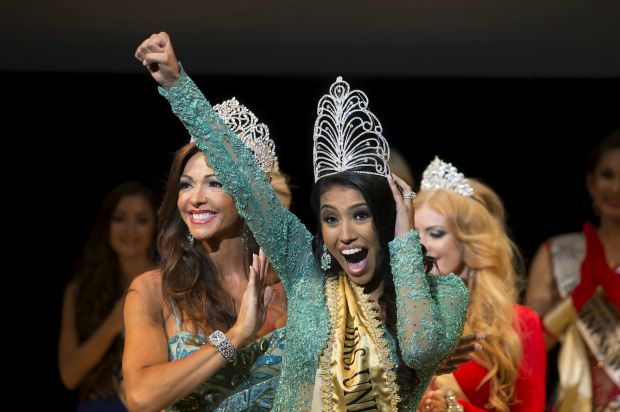On August 29 in Minsk, Belarus, Canadian Ashley Callingbull became the first Enoch Cree First Nations woman to be named Mrs. Universe. Not to be confused with the Miss Universe pageant, Mrs. Universe requires its contestants to be married, and there is no bathing suit portion of the competition. Contestants are judged on the basis of their advocacy, not their looks.
So it should have come as no surprise that the new Mrs. Universe, who is also an outspoken survivor of sexual abuse, immediately started calling for Canadians to oust Stephen Harper as Prime Minister. Leader of the Conservative Party, Harper has a “conspicuously awful” record of relations with First Nations and is none too popular with farmers.
https://twitter.com/Truenorthguy/status/640571145675231233/photo/1
Among other things, explains Alexis Kienlen, a writer and agricultural reporter from Edmonton, Harper “really turns a blind eye to the fact that hundreds of aboriginal women are missing or have been murdered.”
Over the past year, Harper has faced a rising tide of criticism which has coalesced around two issues: 1) his failure to address the violence against Indigenous women, and 2) his resistance to environmental protections. In response, Harper tweeted out an image proclaiming the Conservative Party’s commitment to “Conservation and Outdoor Communities,” but he used a stock photo of woodsy Little Crater Lake — in Oregon, USA. In his critics’ eyes, Harper’s dismissive, “All Look Same!” attitude merely underscored the perception that his professed interest in preserving Canada’s wilderness for future generations was, at best, insincere.
Led by members of the First Nations, the Canadian movement “Idle No More” has been calling for changes to government policies that currently “infringe on environmental protections.” INM is also advocating for a national inquiry into the missing and murdered Indigenous women. Why the growing outcry? In 2014, the Royal CanadianMountedPolice (RCMP) released a report indicating that 1,017 Aboriginal (i.e. Indigenous) women had been murdered between 1980 and 2012, with 164 Aboriginal women missing for longer than 30 days. “The rate of victimization among Aboriginal females,” the report concluded, “was close to three times higher than that of non-Aboriginal females.”
In its response to this report, Amnesty International-Canada noted that the RCMP had never before sought to clarify the level of violence against Indigenous women, and that its numbers may be incomplete.
When set against the invisible deaths of a thousand murdered Indigenous women, Ashley Callingbull’s historic win starts to resonate beyond the usual parameters of the spectacle of the beauty pageant. In an interview with the National Post, Callingbull observed: “A lot of people don’t expect me to be up there and have a title because I’m First Nations. That’s how stereotypical society is and how racist it can be. I’m still experiencing some of that racism on some of my posts — some people are saying ‘I’m not a real Canadian,’ which is silly.” She is aware that people are suddenly listening to her because she is the 2015 Mrs. Universe, even as they might dismiss her as a beautiful bobble head for the same reason. Still, she refuses to “be pretty and shut up.”
Callingbull speaks out in order to affirm that her people have a right to be heard. Her fellow Canadian, artist Tanya Tagaq, sings for the same purpose. Both Callingbull’s and Tagaq’s advocacy for Indigenous peoples, the land, and Nature itself, is bound up intimately with who they are and what they do. Systematically overlooked, the deaths of too many Indigenous women cannot be disentangled from the casual destruction of natural resources in the name of profit. If the government refuses to acknowledge the murder of women with names and faces, how will skeptics ever be convinced that “the wilderness” needs protecting?
Last September, Tagaq’s powerful voice released a wail heard around the world. The Inuk throat singer defied every odd by winning Canada’s top music award for her indie album “Animism,” but it was her stunning performance for the Polaris Music Awards that brought the weeping audience to its feet. An incantation of spirits, her performance bridged the sonic gap between this world and the next, her vocal chords releasing indescribable sounds that channeled the cries of missing and murdered Indigenous women whose names scrolled behind her onstage.Tagaq would name them, and thus exposed Canada’s disgrace.
Of Ashley Callingbull, Tagaq says: “Canada is waking up. Indigenous people are using their voices to outline past and present issues, and Canadians are giving room to our voices. Ashley Callingbull is a beacon. Her forthright conviction is what we need to move forward. So many have paved the way for an awakening. Our land needs us. We need each other.”

